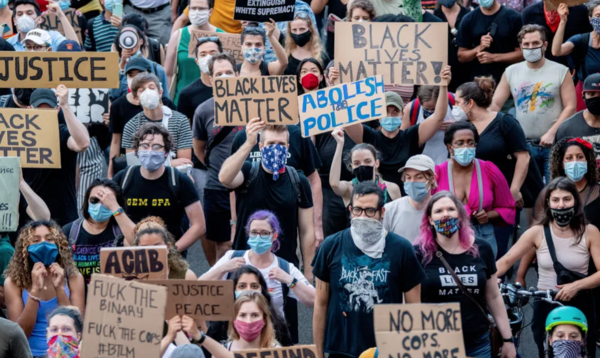Happy Thursday, loyal readers, and thank you for opening The Highlighter. The other day, it hit me yet again that I haven’t set foot in a school building for more than a year, which is an odd thing for me to say, given that I’ve been an educator my whole career. Many of you are in education, too, and if you’re back in your classroom, I’d love to hear how it’s going. In the meantime, I’ll keep looking for education-related articles that aren’t all about people being mean and yelling at each other.
This week’s articles are shorter than normal, but they’re outstanding nonetheless, and I hope you read multiple. The lead essay, “White People, Black People Are Not Your Medicine,” challenges the performative move of buying books for anti-racism and then never reading them — or maybe as bad, reading them to seek absolution or to be seen as a good person.
If that piece isn’t relevant to you, skip down to Roxane Gay’s article on fat shaming, Beth Nguyen’s essay on name shaming, and Jennifer Chong Schneider’s reflection on dating and relationships. And course, there’s the pet photo and the pasta podcast. Please enjoy!
+ Want to jettison your Pandemic Life, flee to France, and bake bread? If so, join Article Club this month, where we’ll be discussing “Baking Bread in Lyon,” one of my favorite three articles of 2020. Author Bill Buford will participate in our conversation (and optionally critique your sourdough). Here’s more info and here’s the sign-up form. Try it, you’ll like it!
+ Also, if Article Club sounds like too much of a commitment right now, but you’d still like to connect with other thoughtful readers and talk about the articles in a different format, please hit reply, let me know, and let’s brainstorm ways to make that happen.
White People, Black Authors Are Not Your Medicine
Yaa Gyasi: “I make my living off my imagination, but this summer, as I watched Homegoing climb back up the New York Times bestseller list in response to its appearance on anti-racist reading lists, I saw again, with no small amount of bile, that I make my living off the articulation of pain too. My own, my people’s. It is wrenching to know that the occasion for the renewed interest in your work is the murders of black people and the subsequent ‘listening and learning’ of white people. I’d rather not know this feeling of experiencing career highs as you are flooded with a grief so old and worn that it seems unearthed, a fossil of other old and worn griefs.
“While I do devoutly believe in the power of literature to challenge, to deepen, to change, I also know that buying books by Black authors is but a theoretical, grievously belated and utterly impoverished response to centuries of physical and emotional harm.” (7 min)
On the way to our vacation spot last week, my partner and I made sure to stop at Krispy Kreme for a delightful doughnut, free with our vaccine card. We didn’t heed the warnings of physicians, who attacked the company’s promotion and reminded us that a daily doughnut dose could be deleterious. In this thoughtful response, Roxane Gay suggests that maybe we should stop demonizing fat people and start acting on the real health problems our country faces. (9 min)
+ No, we didn’t get a doughnut on the trip back.
+ Ms. Gay has appeared many times in the newsletter. Her newsletter, The Audacity, includes sharp writing and the work of emerging writers.
Beth Nguyen: “Names are deeply personal and deeply public. We have to see our names all the time. Every form, every post, every e-mail. “Your name here” at the top of every assignment in elementary school. The other kids would decorate their names with stars and hearts; they would try to make their names look bigger than everyone else’s. The sight of their names gave them pleasure and satisfaction. I have never felt this pleasure, not once. Not even with publications. To me, my name has been a taunt. I’m always trying not to look at it.” (9 min)
In this newsletter’s first article about dating, Jennifer Chong Schneider explores how men have denigrated and fetishized her Asian identity. Brilliantly crafted in a question-and-answer format, the essay combines painful anecdotes with thoughtful reflections on trust and white aspirationalism. The daughter of a Korean woman and an abusive white American man, Ms. Chong Schneider questions her desire when she dates a Korean man for the first time. “Trust means that a person will take care with your feelings, and they will do it without effort.” (17 min)
+ Pasta Update: If you’ve been following the bucatini brouhaha (see Issues #276, #277, and #278), you can set that aside and focus now on cascatelli, the new pasta in town, a creation of Dan Pashman and his Mission ImPASTAble series. Yes, by all means, please weigh in with your thoughts, especially if you’re lucky enough to sample the prized pasta.
Thank you for reading another issue of The Highlighter. Did you enjoy it? Let me know by clicking on “Yes” or ”No” below. I like hearing from you.
Also, to our new subscriber Debby, I hope you find the newsletter a solid addition to your email inbox. To our long-time subscribers (e.g., Olivia! Luke! Monica!), you’re pretty great, too.
If you like The Highlighter, please help it grow. I appreciate your support. Here are a few ways you can help:
Forward today’s issue to a friend and urge them to subscribe
Keep my reading energy up by buying me a coffee — or three (like Trisha, thank you!) or 10 (like Irene, thank you!).
Take a bold stand, go all in, and become the 50th Highlighter VIP.
On the other hand, if you no longer want to receive this newsletter, please unsubscribe. See you next Thursday at 9:10 am PT!

